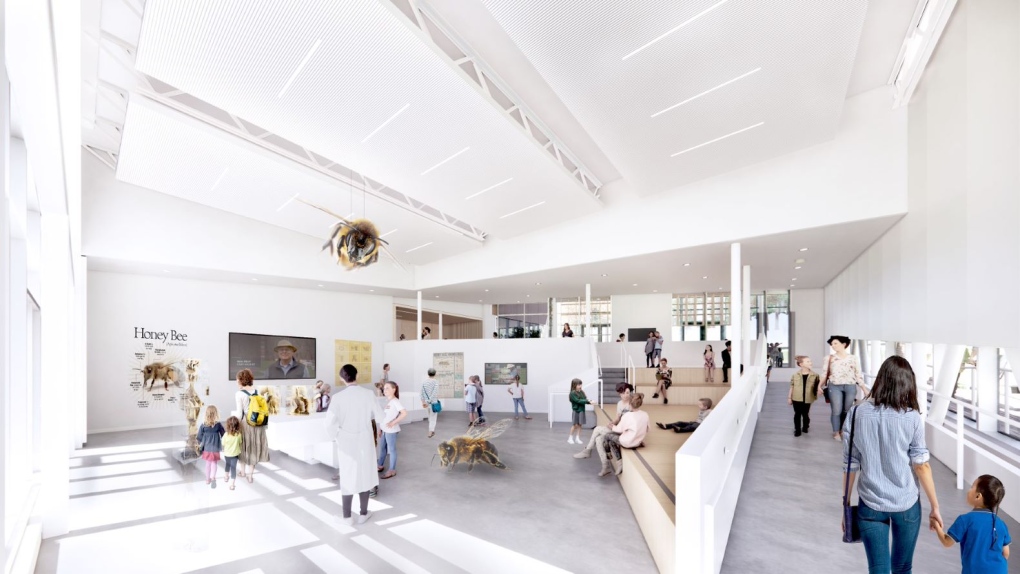University of Guelph building new honeybee research hive
 An artist's rendering of the new Honey Bee Research Centre. (Courtesy: University of Guelph)
An artist's rendering of the new Honey Bee Research Centre. (Courtesy: University of Guelph)
Researchers at the University of Guelph are doing their part to save the bees.
On Wednesday, the school broke ground on a new $16 million research facility, called the Honey Bee Research Centre.
The 15,000-square-foot building will be built on Stone Road, where the bee researchers currently work.
“This new Honey Bee Research Centre will allow us to scale up research and outreach,” said Dr. John Cranfield, Ontario Agricultural College associate dean external relations, in a media release. “The new facility will give the centre space to grow its engagement with apiarists, with community members interested in learning more about pollinators and honeybees, and with young people looking to be a part of positive change to support pollinators and to ensure a healthy environment and a safe food supply.”
According to release, the centre will include indoor and outdoor education spaces, classrooms, event space, a laboratory, bee breeding facilities and pollinator gardens.
They also said the centre will be used to investigate the causes and potential solutions for the decline of pollinators.
 A rendering for the inside of the new research facility. (Submitted/University of Guelph)
A rendering for the inside of the new research facility. (Submitted/University of Guelph)
A “bee tree forest” will be created near the facility, with pollinator-friendly trees like basswood, maples and willows.
“Of all the things you can do to benefit bees, the number one thing is to provide bee habitat and forage,” saidresearch and apiary manager Paul Kelly.
The university said it currently manages the largest number of research honeybee colonies in North America, with 100 hives in the apiary and another 200 hives at the Arkell Research Station, as well 12 privately-run farms in the area.
The Honey Bee Research Centre first opened in 1894. The school has been working out of a repurposed bungalow near the school’s arboretum for decades, and more space is needed for research.
The university said $7.5 million for the project is coming from Lydia Luckevich, a U of G chemistry grad, and her late husband Don Pinchin, founder of the environmental consulting firm Pinchin Ltd.
The university expects the centre to open in 2025.
CTVNews.ca Top Stories

Trump threatens to try to take back the Panama Canal. Panama's president balks at the suggestion
Donald Trump suggested Sunday that his new administration could try to regain control of the Panama Canal that the United States “foolishly” ceded to its Central American ally, contending that shippers are charged “ridiculous” fees to pass through the vital transportation channel linking the Atlantic and Pacific Oceans.
Wrongfully convicted N.B. man has mixed feelings since exoneration
Robert Mailman, 76, was exonerated on Jan. 4 of a 1983 murder for which he and his friend Walter Gillespie served lengthy prison terms.
opinion Christmas movies for people who don't like Christmas movies
The holidays can bring up a whole gamut of emotions, not just love and goodwill. So CTV film critic Richard Crouse offers up a list of Christmas movies for people who might not enjoy traditional Christmas movies.
Can the Governor General do what Pierre Poilievre is asking? This expert says no
A historically difficult week for Prime Minister Justin Trudeau and his Liberal government ended with a renewed push from Conservative Leader Pierre Poilievre to topple this government – this time in the form a letter to the Governor General.
New York City police investigate death of woman found on fire in subway car
New York City Police on Sunday were seeking a man they believe is connected to the early morning death of a woman who was sleeping on a stationary subway train before she was intentionally lit on fire.
More than 7,000 Jeep SUVs recalled in Canada over camera display concern
A software issue potentially affecting the rearview camera display in select Jeep Wagoneer and Grand Cherokee models has prompted a recall of more than 7,000 vehicles.
'I'm still thinking pinch me': lost puppy reunited with family after five years
After almost five years of searching and never giving up hope, the Tuffin family received the best Christmas gift they could have hoped for: being reunited with their long-lost puppy.
10 hospitalized after suspected carbon monoxide poisoning in Ottawa's east end
The Ottawa Police Service says ten people were taken to hospital, with one of them in life-threatening condition, after being exposed to suspected carbon monoxide in the neighbourhood of Vanier on Sunday morning.
Pickup truck driver killed by police after driving through Texas mall and injuring 5
A pickup truck driver fleeing police careened through the doors of a JCPenney store in Texas and continued through a busy mall, injuring five people before he was fatally shot by officers, authorities said.


































